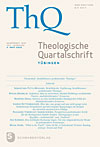archivierte
Ausgabe 2/2022 |


 |
      |
 |
|
|
|
|
 |
|
| Leseprobe 3 |
DOI: 10.14623/thq.2022.2.254–273 |
|
| Musa W. Dube |
| “What is the Truth?” (John 18:38) |
| A Postcolonial Trickster Reading of Jesus’ Arrest and Trial |
 |
Introduction: Historical Contexts and Reading
As a child of Zimbabwean migrants who relocated to Botswana when black people were dispossessed of their land, my own historical context is postcolonial. Like other Two-Thirds World populations, modern imperialism has remained a narrative woven into our bodies, spirits, minds and lands, ever demanding to be read and interpreted. Postcolonial framework of reading is thus the art of wrestling with the past and the present in the quest to glean our shared futures, changed and healed futures. Postcolonial literary theories describe myriad ways of reading that explore how imperialism was imposed on various nations/populations and times; its impact on the colonized populations and lands, and how the colonized responded/resisted/collaborated/survived. In literary studies, postcolonial theories explore the production and role of literature and cultural texts in the modern imperial–colonial relationships by examining texts that arise from both ends as well as the role of pre-existing literature. The application of postcolonial theories to biblical literature falls to the latter.
For most Two-Thirds World populations, biblical literature was pre-existing literature that came with modern colonizing powers and was received by the colonized subjects of Christian empires. Consequently, in biblical studies, postcolonial ways of reading examine, amongst other numerous ways, how biblical texts were used in modern times to endorse, resist, reject or collaborate with imperialism by interrogating the ideology of ancient biblical texts, the intersection of colonizing ideology of ancient and modern times and the use of biblical texts in imperial colonial context, the intersection of colonialism with gender, race, and the construction of identities and the representations of the Other. A postcolonial approach may examine the social location and interpretation of the colonizing, colonized, displaced/diaspora, and contemporary biblical readers in relation to imperial–colonial power struggles of the past and contemporary times. It may also examine the context of the production of biblical texts; the imperial movements of ancient times by looking at how the biblical nation (or Jews) resisted, rejected or collaborated with various imperial movements of their time, and how these embedded textual positions functioned in the modern imperial–colonial context for supporting imposition, resistance, and collaboration with imperial forces. A major part of postcolonial studies investigates the contact zones, boundaries, border-crossing, border-patrol, the in-between spaces or the third space created by the collision of the colonized and the colonizer, which inevitably begets hybridity and mimicry. In sum, postcolonial theories examine the intertwinement of international histories by highlighting international geographies of domination, subordination, and resistance through placing cultural texts at the center of imperial–colonial power struggles. Biblical texts and its readers of various times and places are therefore not exempt; in fact, they are at the center of it.
Against this background, this article shall examine the events leading to the arrest of Jesus, the arrest itself, and the trial of Jesus in the gospel of John. The article shall be examining the world of the text, by looking at how the characters of the story respond to the historical imperialism of their time. The latter will involve looking at the characterization of Jewish leaders, Jesus, and the Johannine community. Since all texts are always ambiguous and complex far more than any reader’s discernment, it is important that I should state my guiding questions, which also constitute the limitations of my article and its findings. My guiding questions shall be as follows: Are the Jewish leaders of the Johannine gospel collaborating, resisting or rejecting the Roman Empire’s rule? In short, I seek to investigate the standpoint of Jewish leaders towards the empire as presented in John's gospel. My second question is what are the standpoints of Jesus and the Johannine community (who are producers of the Gospel of John)? Are they collaborating, resisting, or rejecting the Roman Empire? Does the ideology that informs their movement resist, embrace or collaborate with imperialism? In asking these questions, I shall be dealing with both the historical world of the text and the world within the text. Clearly, this means that I shall be reading on and through the text (in front and behind). I shall be interrogating the narrative devices of the text and what they tell us while, at the same time, I am working on a very strong assumption that the narrative arises from a particular historical world: an imperialized context. While I do not equate the narrative with historical facts, I nonetheless assume that history informed the narrative of John’s gospel. I am particularly interested in the historical context of the Roman Imperialism and how it informed the construction of the Johannine passion. In short, my postcolonial approach reads the text as both a mirror and a window to the past. My questions are informed and motivated by the experience of modern Christian nations who worked hand in glove with the modern imperialism of their leaders and colonizing nations. I am largely driven by the quest to understand why modern Christian nations were unable to name imperialism as unacceptable, evil, and exploitative structure. [...]
Lesen Sie den kompletten Artikel in der Printausgabe.
|
|
|
|
|
|
|
Anzeigen
|
Mit Anzeigen und Inseraten erreichen Sie Ihre Zielgruppe. Anzeige aufgeben
|
 |
|
Unsere Dienstleistung für Verlage, die Ihr Abogeschäft in gute Hände geben wollen.
|

mehr
Informationen
|
 |
|
| Bücher & mehr |

|
|

